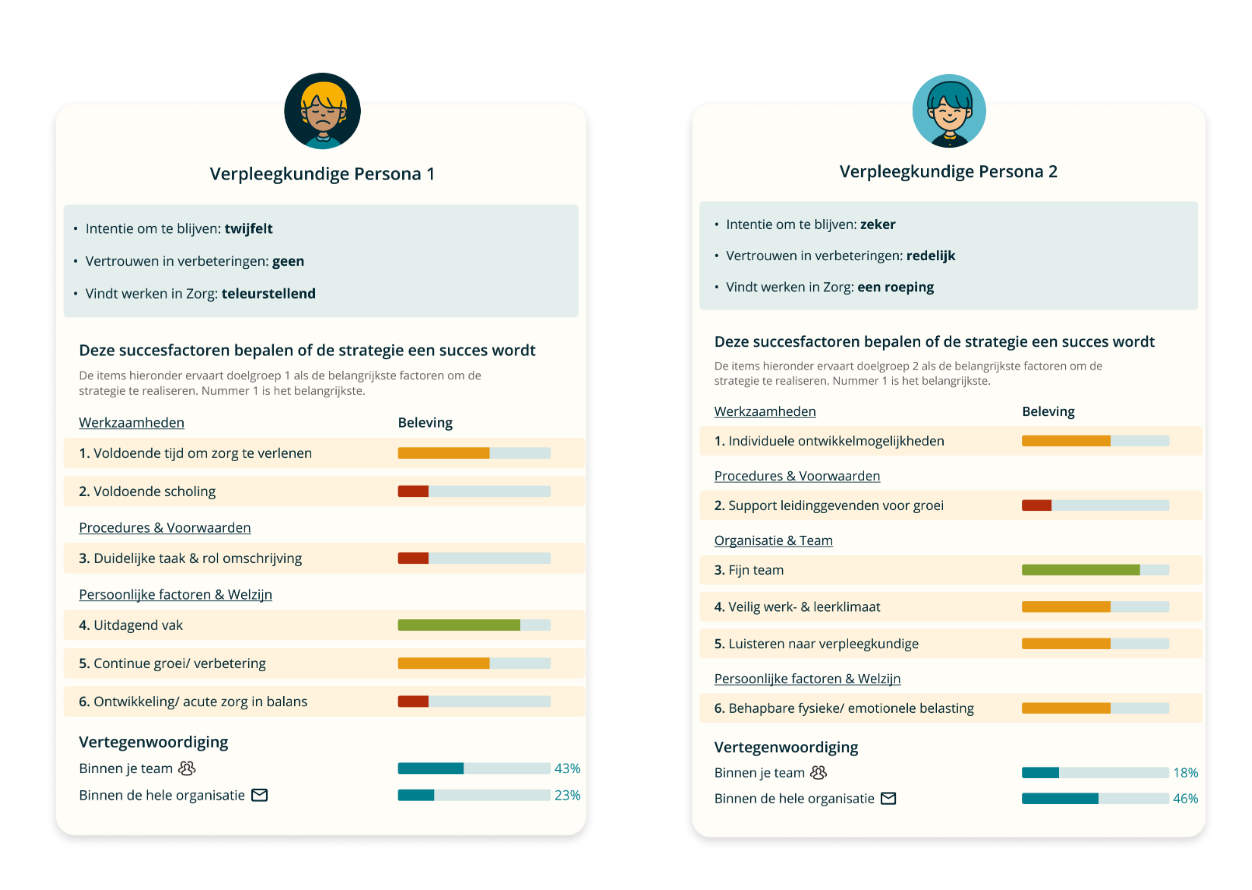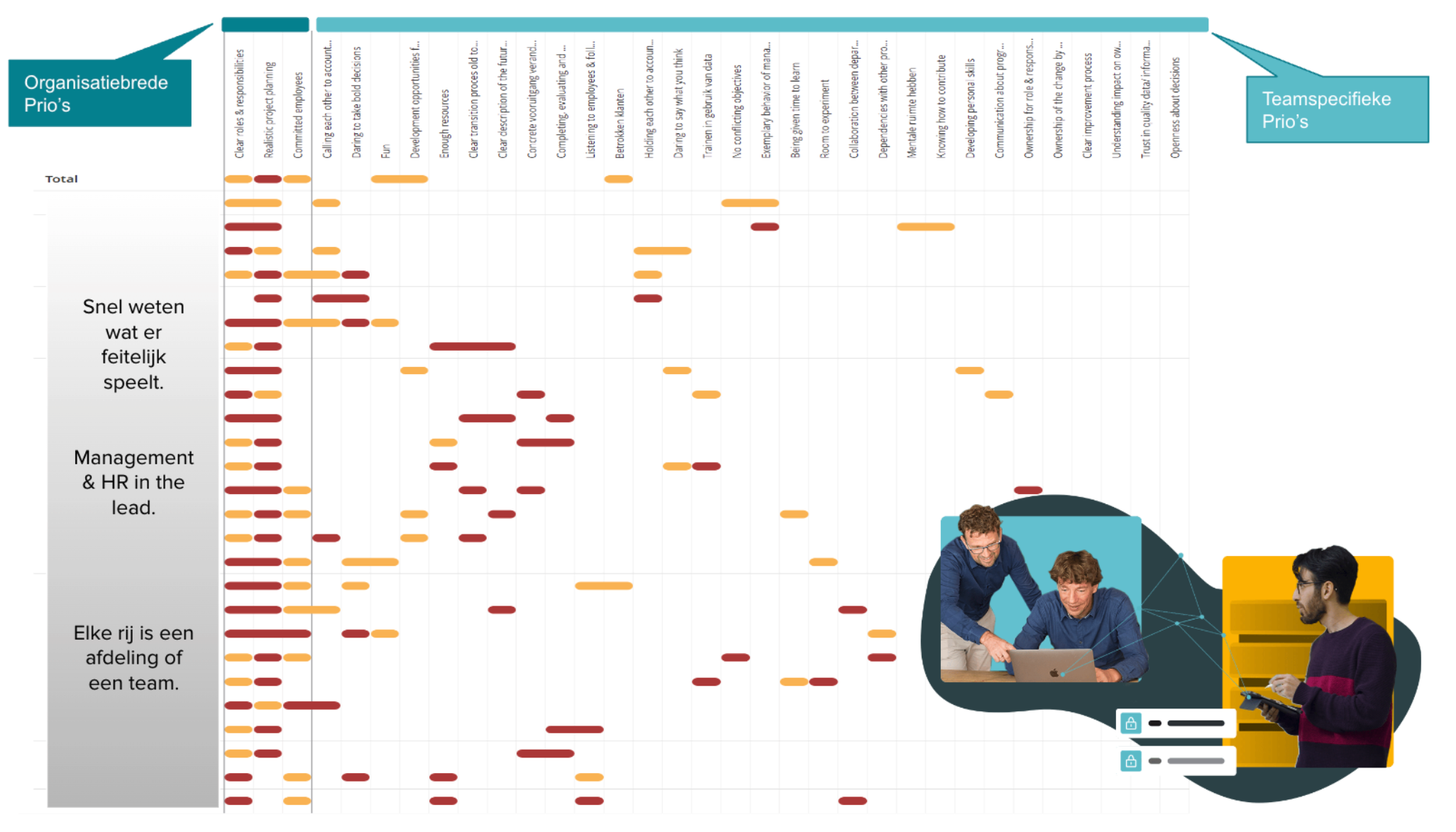Share this
How do I activate managers and teams to work with the results of an ESS?
by Robert-Jan on May 3, 2023 11:23:25 AM
In a rapidly changing world, it is essential for organizations to understand what drives their employees and what their needs are. Conducting an Employee Satisfaction Survey (ESS) is an important step, but the results must also be translated into concrete actions. In this article, we discuss how managers and teams can be activated to work with the results of an ESS, using data and insights from Smart Conversations.
Smart Conversations
Smart Conversations is an advanced technology that enables large-scale personalized conversations on various topics such as engagement, strategy, change management, new standards and more. Using advanced algorithms, conversation data is clustered into employee personas, allowing you to develop more targeted policies and communications.
The power of employee personas in the ESS
Smart Conversations collects and analyzes conversation data to create employee personas. These are profiles of groups of employees with similar expectations and needs. By understanding the distribution of personas within the organization and teams, more targeted advice can be given on which topics are best addressed, based on the survey results.

Data driven decision making for teams and managers
Instead of relying on models, Smart Conversations' approach is based on data and facts from the organization. This ensures a relevant and impactful focus on improvements. HR and executives can work on organization-wide themes, while team managers address specific team-oriented topics with the help of HR, based on ESS results.
Layered agenda: Organization-wide and team-specific ESS themes
Smart Conversations leads to a layered agenda that addresses both organization-wide and team-specific themes based on the survey results. This provides a holistic approach that involves all layers of the organization in the improvement process. Working on relevant themes that are based on data, ensures higher motivation among employees.

Motivation by impact and relevance of ESS results
Working on the issues that have the most impact on improvements creates a sense of relevance among employees. This is a key driver of motivation and engagement. Employees see that their feedback and needs are taken seriously and that the organization is investing in improvements that really matter, based on ESS results.
Conclusion: Activate managers and teams with ESS results
Activating managers and teams to work with the results of an employee survey is critical to an organization's success. By leveraging data and insights from Smart Conversations, HR and managers can target improvements that have the most impact on employees. This approach increases motivation and engagement within the organization and contributes to overall success. With a layered agenda, data driven decision making and a focus on both organization-wide and team-specific themes, the organization can effectively address employee expectations and needs that emerge from ESS results.
Get in touch, and one of our advisors will be happy to tell you more.
Share this
- social intranet (44)
- onboarding process (16)
- covid-19 (15)
- technology (15)
- internal communication (12)
- company news (10)
- AVG (8)
- employee engagement (8)
- client stories (7)
- Smart Conversation (6)
- hybrid work (4)
- employee app (3)
- partners (3)
- community platform (2)
- events (2)
- social learning (2)
- ESS (1)
- April 2025 (1)
- March 2025 (1)
- December 2024 (3)
- October 2024 (2)
- August 2024 (1)
- June 2024 (5)
- May 2024 (4)
- April 2024 (1)
- March 2024 (22)
- February 2024 (7)
- May 2023 (10)
- March 2023 (4)
- December 2022 (3)
- November 2022 (3)
- October 2022 (1)
- August 2022 (1)
- July 2022 (1)
- June 2022 (2)
- May 2022 (1)
- April 2022 (1)
- March 2022 (3)
- February 2022 (1)
- January 2022 (1)
- November 2021 (3)
- October 2021 (2)
- September 2021 (1)
- July 2021 (2)
- April 2021 (2)
- March 2021 (1)
- January 2021 (1)
- May 2020 (1)
- September 2019 (1)
- July 2019 (1)
- May 2019 (2)
- March 2019 (1)
- February 2019 (2)
- January 2019 (1)
- December 2018 (2)
- November 2018 (1)
- October 2018 (1)
- June 2018 (2)
- May 2018 (1)
- March 2018 (1)


